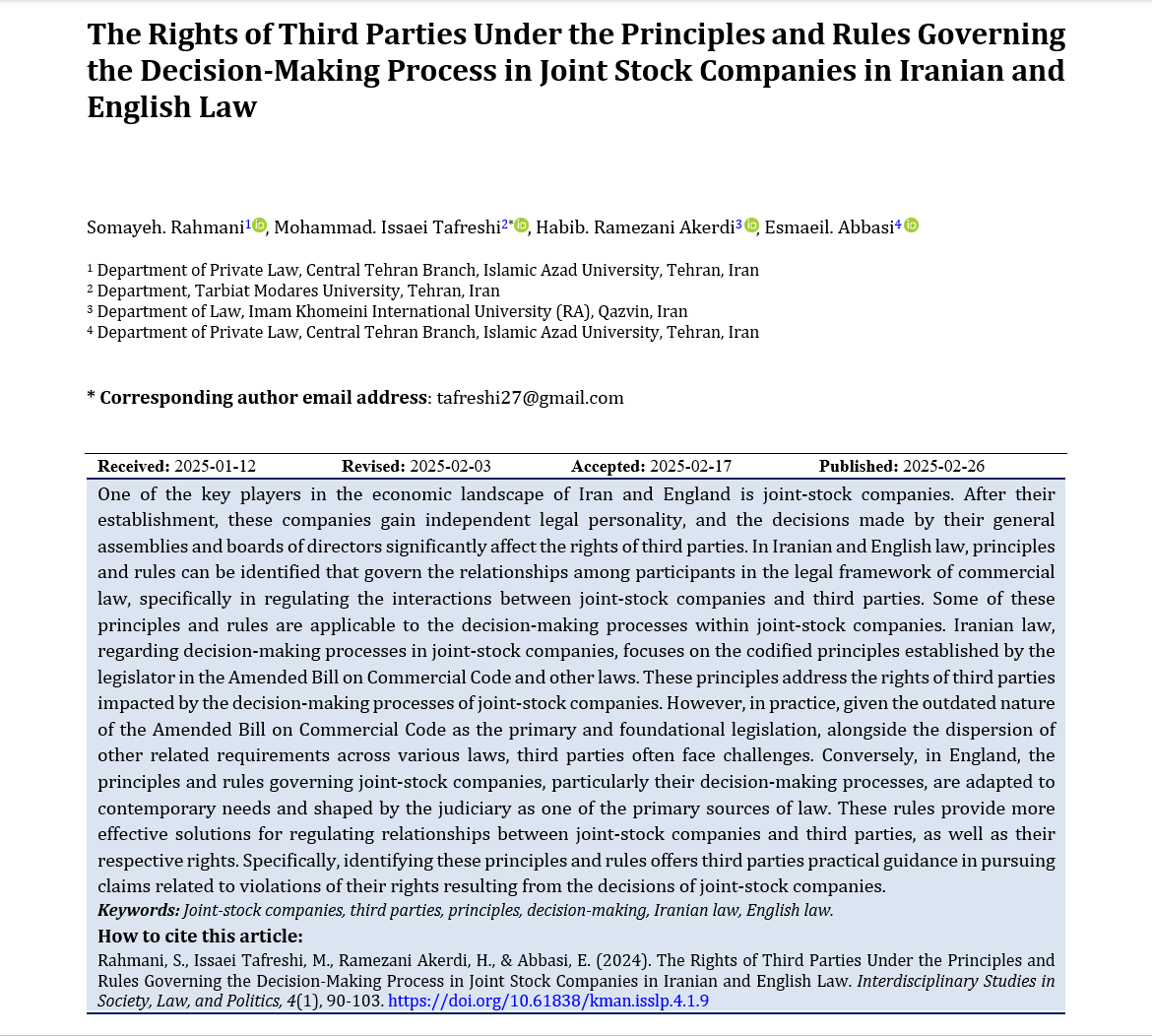The Rights of Third Parties Under the Principles and Rules Governing the Decision-Making Process in Joint Stock Companies in Iranian and English Law
Keywords:
Joint-stock companies, third parties, principles, , decision-making, Iranian law, English lawAbstract
One of the key players in the economic landscape of Iran and England is joint-stock companies. After their establishment, these companies gain independent legal personality, and the decisions made by their general assemblies and boards of directors significantly affect the rights of third parties. In Iranian and English law, principles and rules can be identified that govern the relationships among participants in the legal framework of commercial law, specifically in regulating the interactions between joint-stock companies and third parties. Some of these principles and rules are applicable to the decision-making processes within joint-stock companies. Iranian law, regarding decision-making processes in joint-stock companies, focuses on the codified principles established by the legislator in the Amended Bill on Commercial Code and other laws. These principles address the rights of third parties impacted by the decision-making processes of joint-stock companies. However, in practice, given the outdated nature of the Amended Bill on Commercial Code as the primary and foundational legislation, alongside the dispersion of other related requirements across various laws, third parties often face challenges. Conversely, in England, the principles and rules governing joint-stock companies, particularly their decision-making processes, are adapted to contemporary needs and shaped by the judiciary as one of the primary sources of law. These rules provide more effective solutions for regulating relationships between joint-stock companies and third parties, as well as their respective rights. Specifically, identifying these principles and rules offers third parties practical guidance in pursuing claims related to violations of their rights resulting from the decisions of joint-stock companies.
Downloads
References
Barari, A. (2017). Law System Ruled on Government-Owned Corporations and Privatization. Majd Publications.
Dignam, A., & Lowry, J. (2012). Company Law. Oxford University Press.
Eskini, R. (2019). Commercial Law: Trading Corporations. Samt Publications.
Eskini, R., & Delfani, S. (2018). The Effect of Transcending the Scope of Activities of Joint-stock Companies by their Directors: A Comparative Study in Iranian and English Law. Journal of Comparative Law, 5.
Griffin, S. (2006). Company Law: Fundamental Principles. Pearson Education Press.
Hajiha, Z., & Chenari, H. (2023). The Effect of Accounting Comparability on Financial Reporting Quality with Emphasis on Audit Quality. Journal of Judgment and Decision Making in Accounting, 5(2).
Hannigan, B. (2012). Company Law. Oxford University Press. https://doi.org/10.1093/he/9780199608027.001.0001
Issaei Tafreshi, M. (2021). Analytical Studies on Company Law; Public and Private Companies. Tarbiat Modares University Press.
Lowry, J., & Reisberg, A. (2014). Pettet's Company Law and Corporate Finance. Pearson Education Press.
McLaughlin, S. (2013). Unlocking Company Law. Routledge Publications. https://doi.org/10.4324/9780203779071
Nodoushan, M. S., & Bagheri, M. (2016). Conflict of Interests of Company Stakeholders and Its Strategies. Comparative Law Research Quarterly, 20(3).
Pasban, M. R. (2021). Company Law. Samt Publications.
Saghri, M. (2022). COMMERCIAL LAW; Companies. Majd Publications.
Sealy, L., & Worthington, S. (2013). Sealy & Worthington's Cases and Materials in Company Law. Oxford University Press. https://doi.org/10.1093/he/9780199676446.001.0001
Soltani, M. (2021). Capital Market Law. Samt Publications.

Downloads
Additional Files
Published
Submitted
Revised
Accepted
Issue
Section
License
Copyright (c) 2025 Interdisciplinary Studies in Society, Law, and Politics

This work is licensed under a Creative Commons Attribution-NonCommercial 4.0 International License.





